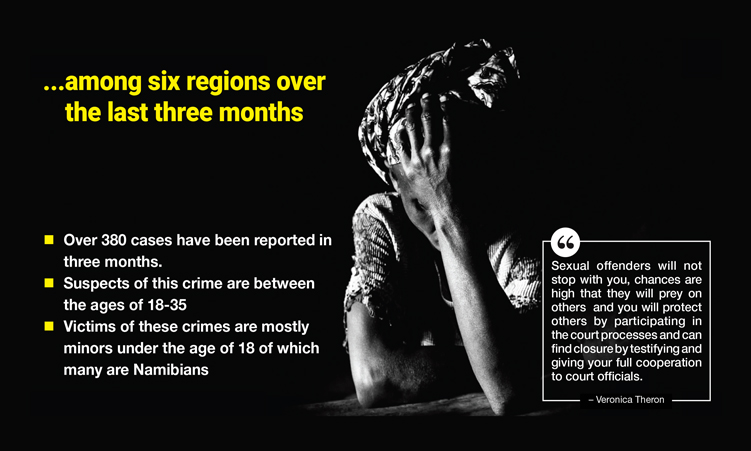Over 380 cases of gender-based violence (GBV) have been reported in six regions over the last three months.
On average, this reflects over 100 cases reported monthly in the Zambezi, Oshikoto, Kavango, Otjozondjupa, Omusati and Kunene regions.
Namibian Police spokesperson deputy commissioner Kauna Shikwambi this week revealed that these regions recorded 384 cases.
The Oshikoto region reported the highest number of cases at 98 with 86 arrests. The Omusati region followed with 94 cases and 49 arrests, while the Otjozondjupa region recorded the lowest number of cases at 20 with eight arrests.
“Most of the GBV [incidents are] happening at homes and most of the victims of these crimes are women and children, while most of the perpetrators are domestic workers and relatives staying in the same houses,” Shikwambi said.
The deputy commissioner highlighted that some of the challenges faced when handling GBV cases is the withdrawal of cases by the victims and complainants, and some not attending court proceedings.
“Among the reports over the last three months, in most of the reports it was observed that some of the contributing factors of GBV are alcohol and drug abuse, poverty, jealousy and peer pressure,” Shikwambi said.
Oshikoto regional commander Teopoline Kalompo-Nashikaku said among the various GBV cases, rape has been dominating in the Oshana region.
“What is worrying me among the GBV cases are those of rape, of which many are among minors.”
She said they have begun looking at various remedies to address the issue in the region.
“After conducting our analysis, the suspects of these crimes are people between the age of 18 and 35, while victims are mostly minors under the age of 18,” she said.
Kalompo-Nashikaku said some rape cases are committed by foreign temporary workers on commercial farms, as well as people north of the redline.
She said the police are reaching out to the Angolan consulate at Oshakati in order to raise awareness on the matter.
A victim who recently spoke to The Namibian on condition of anonymity said the attitude of the frontline workers resulted in her returning home after first attempting to report her case.
“One of the workers was busy having a conversation with her colleagues mid our session of speaking about what happened to me. She kept laughing and asking me to repeat several times which really got to me,” she said.
She said it is draining to share one’s story over and over again. Additionally, there are many delays and often progress updates are not readily available.
Gender and child protection specialist Veronica Theron also emphasised the insensitive attitude of frontline service providers towards survivors, saying the lack of dignity is a factor that results in the withdrawal of cases.
“Delays and postponements of the cases [sic], one case can take more than six years from report to finalisation,” Theron added.
Another contributing factor is the lack of victim and vulnerable witness support services, including court preparation services and debriefing after court hearings. Low conviction rates due to inexperienced prosecutors against experienced lawyers are also a factor, said Theron.
“Parents not willing to put children through hostile court environments and vulnerable witnesses who are scared that the details of their cases will be covered in the media,” she said.
Theron mentioned several cases where the victims have chosen to proceed with cases and attend court after initially considering withdrawing the cases.
“The special measures and special arrangements provided in our legal framework were applied and various measures have been taken into account to prepare them for court,” Theron added.
The various measures put in place are preparations for court done well in advance, as well as no media and members of the public being allowed in court.
Another means was victim and child friendly facilities with close circuits, with no face-to-face contact with the perpetrator or their family.
“Sexual offenders will not stop with you, chances are high that they will prey on others and you will protect others by participating in the court processes and can find closure by testifying and giving your full cooperation to court officials,” Theron said.
Stay informed with The Namibian – your source for credible journalism. Get in-depth reporting and opinions for
only N$85 a month. Invest in journalism, invest in democracy –
Subscribe Now!







